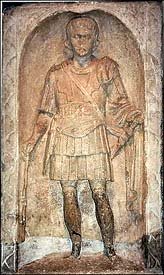The Centurion And Pais
Did you miss this centurion-and-pais
gay partnership in the Bible?
 |
Modern scholarship about the
centurion and pais
Centurion and pais.
Sir Kenneth Dover, a heterosexual scholar, is the former President of Corpus Christi College, Oxford University, and Chancellor of the University of St. Andrews, Scotland, from 1981 until his retirement in 2005 and a noted authority on ancient Greece. In his book, Greek Homosexuality, he informs us that the younger partner in a homosexual relationship is called pais or paidika. This information impacts our Centurion and pais discussion.
“The pais in a homosexual relationship was often a youth who had attained full height.” p. 16.
“The Greeks often used the word paidika in the sense of ‘eromenos.’ ”[Meaning “the boy you are in love with]. p. 16. Paidika, the diminutive of pais, is a term indicating affection.
“The junior partner in homosexual eros is called pais (or of course, paidika) even when he has reached adult height and hair has begun to grow on his face.” p. 85.
Dr. Dover is a recognized authority
on ancient Greek language and culture
 |
Noted Philologist and Greek scholar.
New York Times Book Review: “A landmark study... One cannot underestimate the importance of Mr. Dover's book. With philological brilliance and scholarly objectivity, he presents facts that can no longer be ignored.”
American Historical Review: ”Greek Homosexuality provides, finally, an unvarnished look at Athenian homosexuality... [It is] now the standard volume on the subject.”
New York Review of Books: “Dover's is an authoritative discussion; he is a philologist of great stature with wide achievement as editor, commentator, and literary critic... The subject was one which needed to be exposed to the light of day; we can be thankful that it has been done by a great scholar and one who treats the subject without prejudice.”
Dr. Gagnon, recognized authority
and prominent anti-gay author
 |
Dr. Robert Gagnon,
Pittsburg Theological Seminary.
Dr. Gagnon earned the B.A. degree from Dartmouth, the M.T.S. (Master of Theological Studies) from Harvard Divinity School and the Ph.D. (Magna Cum Laude) from Princeton Theological Seminary.
Dr. Gagnon is Professor of New Testament Theology at Houston Baptist University. Previously he was a tenured Associate Professor of New Testament at Pittsburgh Theological Seminary, teaching there for 23 years (1994-2017).
Dr. Gagnon wrote the leading anti-gay apologetic, The Bible And Homosexual Practice, 520pp, published in 2001.
 |
Why do people get uncomfortable about the centurion and pais relationship?
A Roman Centurion
Dr. Gagnon, arguably the foremost anti-gay scholar of our day, believes pais can be a reference to a partner in a homosexual relationship.
Dr. Gagnon writes: “boy” (pais) could be used of any junior partner in a homosexual relationship, even one who was fullgrown.” Dr. Robert Gagnon, The Bible And Homosexual Practice, p. 163, footnote 6.
Abundant historical evidence
supports the assertions of Drs. Dover and Gagnon about the meaning of pais. Dr. Gagnon certainly does not believe Matthew and Luke told the story of the centurion and his beloved to legitimate gay relationships. However, that Dr. Gagnon, the leading anti-gay apologist admits that pais can describe a partner in a homosexual relationship is encouraging. His admission lends support to the twin truths that the gay Christian view is not historical revisionism and is firmly rooted in historical fact.
For six hundred years before Matthew wrote his Gospel, Greek language and literature used pais to mean “a beloved lover” or “the younger partner in a same sex relationship.” That legitimates our view, that the Centurion and pais story deals with an ancient gay relationship which Jesus blessed.
First century readers
of Matthew’s Gospel in koine Greek would have picked up on the pais references which most twenty-first century English readers miss. Pais and paidika were used by writers in ancient times to refer to a lover in a homosexual relationship.
That is not the only meaning of pais but it is one of the possible meanings. According to biblical Greek lexicons, pais also means "manservant, son, young man or maid," depending on context. We have already noted that many ancient Greek writers, among them Thucydides, Eupolis, Aeschines, Plato, Callimanchus and Plutarch used pais or paidika in the sense of “beloved or same sex lover.”
Do not ignore the cultural setting
in which pais was used.
The cultural and historical setting Matthew 8:5-13 and Luke 7:1-10 addressed as they tell the Centurion and pais story is vitally important. Both Matthew and Luke use the Greek word pais to describe the Centurion's relationship with his “servant.” They used the word pais at a time when that word had definite same sex meaning when used as they used it, to refer to the relationship between a Roman Centurion and his "beloved" pais or servant.
Should we ignore their choice of words because it makes some Christians uncomfortable? Should we ignore the truth of history because it does not fit the anti-gay agenda of some Christians? Does under-standing the common meaning of pais as “beloved or same sex lover” place the Centurion and pais story squarely in the cultural context Matthew and Luke addressed? Yes, it certainly does.
 |
Statue of Centurion
on a horse.
Should we assume that Matthew and Luke were unaware of the common sexual implication of pais when they wrote the Centurion and pais story? That understanding does not make sense. Koine Greek was the common language, not as elegant as classical Greek yet clear in its meaning across the Roman Empire. It makes sense to explore the relevance of Matthew and Luke’s word choice in the context of the cultural, historical and linguistic setting in which it occurred.
Historical context
The New Testament was written in the Roman Empire. The Romans were the occupying power in Israel at the time the Centurion and pais story occurred. Greek language and Roman and Greek cultural mores impacted the writing of the New Testament. Greek words like pais convey the flavor of Greek cultural influence. Because Matthew and Luke intended to tell this story using particular Greek words, we should at least be open to hearing the truth they intended to convey.
Because the Centurion used the word pais to describe the servant he so highly valued, because Jesus commended the faith of the Centurion and because Jesus in His wisdom, chose not to negatively address their implicit sexual relationship, our faithful scriptural understanding of Matthew 8 is that God can and does bless loving gay relationships which are within the Biblical moral framework - committed, faithful, non-cultic.
How does the Roman marriage ban for serving Roman soldiers, instituted by Emperor Augustus before the birth of Christ, affect our understanding of this topic?
 |
Bas Relief of a Roman Centurion, Colchester, England.
Helpful Links To Interesting Information
Is this the same story as John 4:46-53?
From Centurion and pais Return
to Gay Christian 101.com Home Page
Google Translate
into 90 languages
We are saved:
by grace alone through faith alone
Recent Articles
-
Gay Christian 101 - Affirming God's glorious good news for all LGBs.
Jan 08, 24 12:57 AM
Gay Lesbian Bisexual Christian 101 - Accurate biblical and historical info defending LGB Christians from the anti-gay crowd. -
Romans 1 describes ancient shrine prostitution, not gays and lesbians.
Dec 21, 23 04:37 PM
Romans 1, in historical context, is about ancient Roman fertility goddess worshipers who engaged in shrine prostitution to worship Cybele, not gays and lesbians. -
The Centurion And Pais - When Jesus Blessed A Gay Couple.
Nov 14, 23 10:32 PM
Centurion and Pais? If Jesus blessed a gay relationship, would this change your view of homosexuality?
Bible Study Resources
for eDisciples



